初中英语常用句型及解释
初中英语常用句式总结
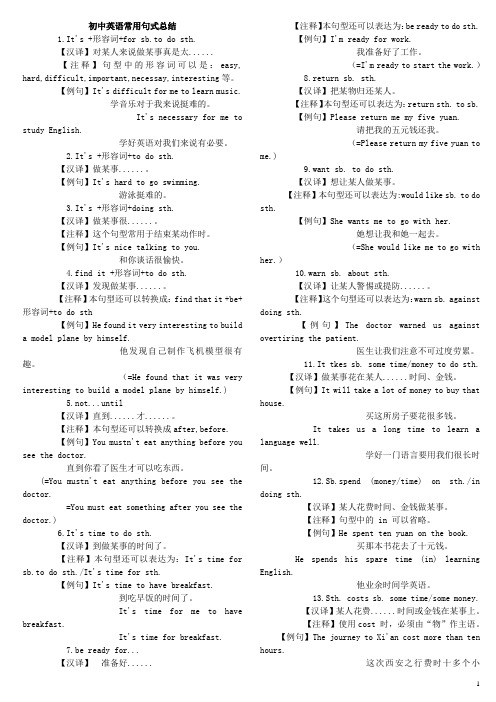
初中英语常用句式总结1.It's +形容词+for sb.to do sth.【汉译】对某人来说做某事真是太......【注释】句型中的形容词可以是:easy, hard,difficult,important,necessay,interesting等。
【例句】It's difficult for me to learn music.学音乐对于我来说挺难的。
It's necessary for me to study English.学好英语对我们来说有必要。
2.It's +形容词+to do sth.【汉译】做某事......。
【例句】It's hard to go swimming.游泳挺难的。
3.It's +形容词+doing sth.【汉译】做某事很......。
【注释】这个句型常用于结束某动作时。
【例句】It's nice talking to you.和你谈话很愉快。
4.find it +形容词+to do sth.【汉译】发现做某事......。
【注释】本句型还可以转换成:find that it +be+形容词+to do sth【例句】He found it very interesting to build a model plane by himself.他发现自己制作飞机模型很有趣。
(=He found that it was very interesting to build a model plane by himself.)5.not...until【汉译】直到......才......。
【注释】本句型还可以转换成after,before.【例句】You mustn't eat anything before you see the doctor.直到你看了医生才可以吃东西。
(=You mustn't eat anything before you see the doctor. =You must eat something after you see the doctor.)6.It's time to do sth.【汉译】到做某事的时间了。
初中英语句子结构及句型细致讲解
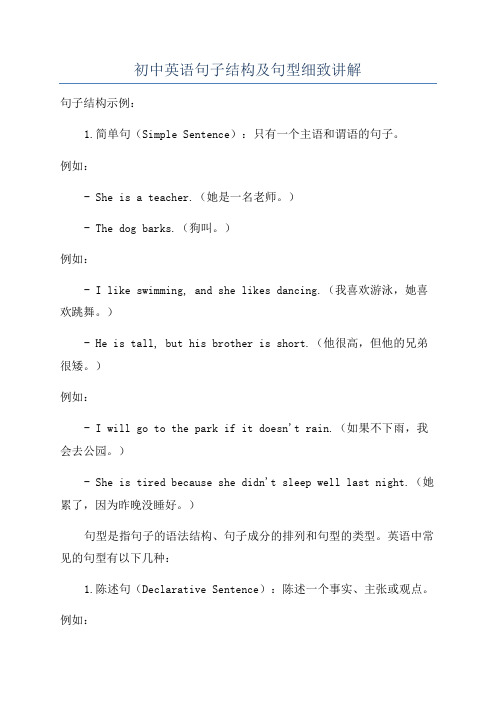
初中英语句子结构及句型细致讲解句子结构示例:1.简单句(Simple Sentence):只有一个主语和谓语的句子。
例如:- She is a teacher.(她是一名老师。
)- The dog barks.(狗叫。
)例如:- I like swimming, and she likes dancing.(我喜欢游泳,她喜欢跳舞。
)- He is tall, but his brother is short.(他很高,但他的兄弟很矮。
)例如:- I will go to the park if it doesn't rain.(如果不下雨,我会去公园。
)- She is tired because she didn't sleep well last night.(她累了,因为昨晚没睡好。
)句型是指句子的语法结构、句子成分的排列和句型的类型。
英语中常见的句型有以下几种:1.陈述句(Declarative Sentence):陈述一个事实、主张或观点。
例如:- He is a student.(他是一名学生。
)- It is a nice day.(今天是个好天气。
)2.疑问句(Interrogative Sentence):询问问题。
例如:- Are you ready?(你准备好了吗?)- Where is the nearest supermarket?(最近的超市在哪里?)3.祈使句(Imperative Sentence):用于发出命令、请求、建议等。
例如:- Be quiet!(安静!)- Please help me.(请帮帮我。
)4.感叹句(Exclamatory Sentence):表达感叹、惊讶或强调。
例如:- What a beautiful sunset!(多么美丽的日落啊!)- How amazing his performance is!(他的表演真是太棒了!)。
初中英语写作中常见的十二种句型及语法汇总
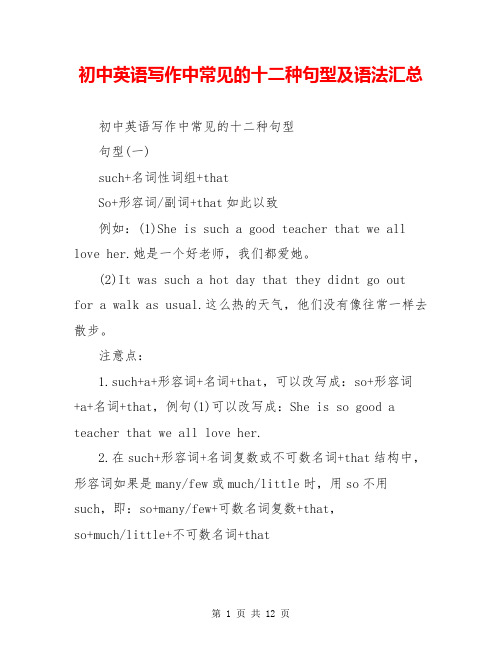
初中英语写作中常见的十二种句型及语法汇总初中英语写作中常见的十二种句型句型(一)such+名词性词组+thatSo+形容词/副词+that如此以致例如:(1)She is such a good teacher that we all love her.她是一个好老师,我们都爱她。
(2)It was such a hot day that they didnt go out for a walk as usual.这么热的天气,他们没有像往常一样去散步。
注意点:1.such+a+形容词+名词+that,可以改写成:so+形容词+a+名词+that,例句(1)可以改写成:She is so good a teacher that we all love her.2.在such+形容词+名词复数或不可数名词+that结构中,形容词如果是many/few或much/little时,用so不用such,即:so+many/few+可数名词复数+that,so+much/little+不可数名词+that(1)There are so many people in the room that I cant get in.房间里人太多,我进不去。
(2)The man has so much money that he can buy a car.那人很有钱,他能买一辆小汽车。
句型(二)There be,eitheror,neithernor,not onlybut also例如:(1)There is a pen and two pencils in his pencil-box.他的铅笔盒里有一支钢笔和两支铅笔。
(2)Not only you but also I have been to the Great Wall.你和我都没有去过长城。
(3)Either you or I am leaving for Shanghai.要么你去上海,要么我去上海。
(完整版)初中英语重要句型及语法
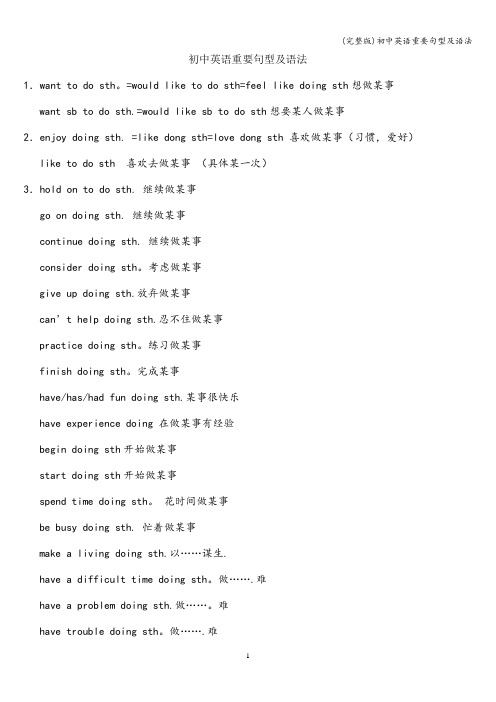
初中英语重要句型及语法1.want to do sth。
=would like to do sth=feel like doing sth想做某事want sb to do sth.=would like sb to do sth想要某人做某事2.enjoy doing sth. =like dong sth=love dong sth 喜欢做某事(习惯,爱好)like to do sth 喜欢去做某事(具体某一次)3.hold on to do sth. 继续做某事go on doing sth. 继续做某事continue doing sth. 继续做某事consider doing sth。
考虑做某事give up doing sth.放弃做某事can’t help doing sth.忍不住做某事practice doing sth。
练习做某事finish doing sth。
完成某事have/has/had fun doing sth.某事很快乐have experience doing 在做某事有经验begin doing sth开始做某事start doing sth开始做某事spend time doing sth。
花时间做某事be busy doing sth. 忙着做某事make a living doing sth.以……谋生.have a difficult time doing sth。
做…….难have a problem doing sth.做……。
难have trouble doing sth。
做…….难keep on doing sth. = keep sb. doing sth。
不停地做某事4.be good at doing sth 擅长于做某事do well in doing sth擅长于做某事thank you for doing sth 感谢做某事thanks for doing sth感谢做某事be used for doing sth 被用于做某事be used to doing sth 习惯做某事how about doing sth 做某事怎样what about doing sth 做某事怎样put off doing sth推迟做某事take pride in doing sth.以……为自豪by doing sth通过做某事be afraid to do sth害怕做某事be afraid of doing sth害怕做某事be terrified of doing sth. 害怕做某事5.be doing sth。
初中英语句型及总结归纳

初中英语句型及总结归纳英语是我们学习的一门重要课程,而句型是英语中的基础。
在初中英语学习中,我们掌握了许多常用的句子结构,这些句型在日常交流和写作中都起到了关键的作用。
本文将对初中英语的句型进行总结归纳,帮助大家更好地掌握和运用这些句型。
一、陈述句陈述句是我们最常用的句子类型,用来陈述事实、描述情况。
以下是一些常见的陈述句型:1. 主语 + 动词 + 宾语例如:I like pizza.(我喜欢比萨。
)2. 主语 + be动词 + 表语例如:She is a teacher.(她是一名教师。
)3. 主语 + do/does + 动词原形例如:They do their homework every day.(他们每天做作业。
)4. 主语 + have/has + 过去分词例如:He has finished his homework.(他已经完成了作业。
)二、疑问句疑问句用于提问,帮助我们获取信息。
以下是一些常见的疑问句型:1. 疑问词 + 助动词 + 主语 + 动词?例如:What do you like?(你喜欢什么?)2. 助动词 + 主语 + 动词?例如:Do you play basketball?(你打篮球吗?)3. 特殊疑问句例如:Where did you go yesterday?(你昨天去哪里了?)三、祈使句祈使句用于表达请求、命令或建议。
以下是一些常见的祈使句型:1. 动词原形 + 其他成分例如:Open the window, please.(请打开窗户。
)2. 动词原形 + 不定代词/名词例如:Eat some fruit.(吃些水果。
)四、感叹句感叹句用于表达惊讶、赞美、喜悦等情感。
以下是一些常见的感叹句型:1. How + 形容词/副词 + 主语 + 动词!例如:How beautiful the flowers are!(花儿多美啊!)2. What + 形容词 + 名词 + 主语 + be动词!例如:What a lovely dog he has!(他有一只多可爱的狗啊!)五、条件句条件句用于表达假设、条件和结果之间的关系。
初中英语中考常考句型及例句(共九大类60个)
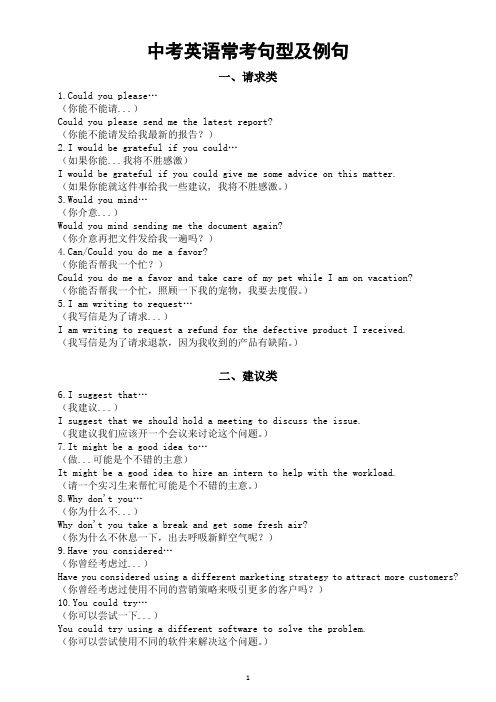
中考英语常考句型及例句一、请求类1.Could you please…(你能不能请...)Could you please send me the latest report?(你能不能请发给我最新的报告?)2.I would be grateful if you could…(如果你能...我将不胜感激)I would be grateful if you could give me some advice on this matter.(如果你能就这件事给我一些建议, 我将不胜感激。
)3.Would you mind…(你介意...)Would you mind sending me the document again?(你介意再把文件发给我一遍吗?)4.Can/Could you do me a favor?(你能否帮我一个忙?)Could you do me a favor and take care of my pet while I am on vacation?(你能否帮我一个忙,照顾一下我的宠物,我要去度假。
)5.I am writing to reque st…(我写信是为了请求...)I am writing to request a refund for the defective product I received.(我写信是为了请求退款,因为我收到的产品有缺陷。
)二、建议类6.I suggest that…(我建议...)I suggest that we should hold a meeting to discuss the issue.(我建议我们应该开一个会议来讨论这个问题。
)7.It might be a good i dea to…(做...可能是个不错的主意)It might be a good idea to hire an intern to help with the workload.(请一个实习生来帮忙可能是个不错的主意。
初中阶段最常见的 40 个句型
初中阶段最常见的40 个句型句型1:There+be +主语+地点状语/ 时间状语There's a boat in the river.河里有条船。
句型2:I think “我认为.…” 否定式I don't think...I think he is a good student.我认为他是个好学生。
I don't think any of them is interesting.我认为他们中任何一个都无趣。
句型3:too...to..… 太……而不能……He is too young to go to school.他太小了不能去学校。
句型4:It takes sb some time to do sth “干某事花了某人一段时间”,it是形式主语,后面的动词不定式(短语)才是真正的主语。
It takes him four hours to finish his homework.写作业花费了他四个小时。
句型5:Though...+主句Though I like writing to my pen-friend,it takes a lot of time.虽然我喜欢给笔友写信,但它要耗费我大量时间。
句型6:What about...?/How about...? “.…怎么样?”,about 为介词,其后须接名词、代词或V-ing 等形式What about another cake? 再吃块蛋糕好吗?How about going out for a walk? 出去散散步好吗?句型7:What's wrong with+sb. / sth. ?此句型相当于What's the matter/trouble with.后+某物作宾语时,意为“某物出什么毛病了?”后+某人作宾语时,意为“某人怎么了?”What's wrong with your watch?你的手表有什么毛病?句型8:How do you like...?How do you like China?你觉得中国怎么样?句型9:What do you like about...?What do you like about China?你喜欢中国的什么?句型10:How+adj. / adv. +主语+谓语!What a/ an+adj. +n. +主语+谓语!How cold it is today!今天多冷啊!What a fine picture it is!多美的一幅图画呀!句型11:had better(not)+动词原形You'd better ask that policeman over there.你最好去问问那边的那个警察。
初中英语日常交际用语情景大全
初中英语日常交际用语情景大全一、打电话(Making phone calls)1、请给某人/某单位打电话。
Would/ could/can you ring up...?请你...打电话好吧?句中ring up意思是"给某人打电话"。
除了用ring up外,还可用call,call up,telephone 等,意思相同。
can you...?用得最普通;could/ would you...?用在正式场合,比较礼貌。
2、电话拨不通时常说:The line is busy .I can't get through.电话占线,我打不通。
/ I'll try again later.我过一会儿再打。
其中line指电话线路,get through 指接通电话。
3、电话拨通后相互打招呼:Hello,(name or telephone number)你好,(并通报本人的姓名或单位名称或电话号码)Hello,is that...speaking?你是...吗?/ Who is that speaking/ calling?你是谁?/ Who is speaking/ calling, please?你是谁?应答时常说:Yes,(this is)...speaking.是的,我是...。
/ Yes,it's...here.我是...。
4、打电话请对方找人或留言:Is...in/ at home? 某某在家吗?/ Can/ may/ could I speak to...,please?请...接电话好吗?/ Will/ would you give a message to..., please?请给...捎个口信好吗?/ Would you tell him my telephone number, please? 请你把我的电话号码告诉他好吗?/ Can / could you ask...to ring me back, please?请叫...给我回个电话好吗?应答时常说:Hold on/ Wait a minute/ One moment, please.请等一等。
初中英语重点句型
初中重点句型*掌握.应用于作文与翻译.要求背诵理解1.I think…意为“我认为……”,是对某人或某事的看法或态度的一种句型。
其否定式常用I don’t think…,2.give sth. to sb./ give sb. sth. 意为“把……给……”,动词give之后可接双宾语,可用这两种句型;若指物的宾语是人称代词时,则只能用give it/ them to sb. 3.take sb./ sth. to…意为“把……(送)带到……”,后常接地点,也可接人。
4.One…, the other…/One is…and one is…意为“一个是……;另一个是……”,必须是两者中。
5.Let sb. do sth. 意为“让某人做某事”,人后应用不带to的动词不定式,其否定式为Don’t let sb,do sth.,或Let sb. not do sth. 另外,Let’s 与Let us的含义不完全相同,前者包括听者在,后者不包括听者在,6.help sb. (to) do sth./help sb. with sth.意为“帮助某人做某事”,前者用不定式作宾补,后者用介词短语作宾补,二者可以互换.7.What about…?/How about…?意为“……怎么样?”是用来询问或征求对方的观点、意见、看法等。
about为介词,其后须接名词、代词或V-ing等形式。
8.It’s time to do…/ It’s time for sth. 意为“该做……的时间了”,其中to后须接原形动词,for后可接名词或V-ing形式。
9.like to do sth./like doing sth.意为“喜欢做某事”,前一种句型侧重具体的一次性的动作;后一种句型侧重习惯性的动作,10.ask sb.(not) to do sth. 意为“让某人(不要)做某事”,其中ask sb.后应接动词不定式,11.show sb. sth. / show sth. to do. 意为“把某物给某人看”,该句型的用法同前面第2点。
初中英语-五种基本句型
初中英语-五种基本句型
一、五种简单句基本句型
1.“主语+谓语”(即“主谓”句型)
这一句型英汉语言结构形式完全相同,说明“某人或某物如何动作”,或者说“某人或某物自身怎样运动”。
例:They arrived in Harbin yesterday morning.
分析:“they”(主语)“arrived”(谓语)。
2.“主语+谓语+宾语”(即“主谓宾”句型)
这一句型英汉语言的结构形式完全相同,用以说明“某人或某物做什么事情”,或者说“某人或某物发出了动作,并且其动作涉及到另一个人或物”。
例:I study English.
分析:“I”(主语)“study”(谓语动作)“English”(宾语即动作涉及的对象)。
3.“主语+谓语+间接宾语+直接宾语”(即“主谓双宾”句型)这一句型英汉语序结构相同,说明“某人为谁(间接宾语为人)做某事”,或者说“某人或物的运动涉及到两个对象,其中一个间接对象为人,另一个为物”。
例:Our teacher taught us English.
分析:“our teacher”(主语)“教”(谓语动作)“us”(间接宾语)“English”(直接宾语)。
4.“主语+谓语+宾语+宾语补足语”(即“主谓宾宾补”句型)这一句型说明“某人或某物要求(使、让)某人做什么”或“某人感觉某人或物怎么样”。
- 1、下载文档前请自行甄别文档内容的完整性,平台不提供额外的编辑、内容补充、找答案等附加服务。
- 2、"仅部分预览"的文档,不可在线预览部分如存在完整性等问题,可反馈申请退款(可完整预览的文档不适用该条件!)。
- 3、如文档侵犯您的权益,请联系客服反馈,我们会尽快为您处理(人工客服工作时间:9:00-18:30)。
初中英语常用句型及解释
10、地点句型
East of the city lie two lakes.
Japan is/lies to the east of China.
My window faces east.
She lives on the east coast.
He is sitting in the front of the classroom.
He is standing in front of/ before me.
He is sitting at the back of the classroom/behind me.
He is sitting next to/beside me.
He is sitting close to/near me.
At the top of/ On top of the shelf, there are some books.
He is sitting on the left/ right.
The mountain you see to the right is the Purple Mountain.
Where there is a will, there is a way.
11、原因句型
He didn't go to school because he was ill.
Since we are all here, let's begin our meeting.
It might have rained last night, for the ground was wet.
Now (that) we have finished the work, we can go home.
I own you a lot of thanks for your kindness to me these years.
That is why he failed to come.
He didn't come because of/ on account of the bad weather.
He went out of curiosity.
This failure is due to the fact that they lack experience.
Owing to our joint efforts, the task was fulfilled.
For what reason did you choose this?
What's the point of asking him to do that?
How come you never told me about it?
12、目的句型
He stopped aside so that she could go in.
He gets up early so as to /in order to have time to do exercises.
He repeated it for fear that there should be any mistake.
13、结果句型
It was very cold, so that the river froze.
They cost a lot of money, so/therefore we use them carefully.
He is such a good man that every one likes him.
He ran so fast that no one could catch him.
He hurried to the house only to find that it was empty.
I was caught in the rain. As a result, I had a bad cold.
14、程度句型
How often do you write to your parents?
How long do you stay at home?
Maybe the task is too much for you.
He is not old enough to know this.
The letter must be sent as soon as possible.
You must work as hard as you can.
As far as I know, I can speak only English.
15、让步句型
Though/ Although he is rich, (yet/still) he doesn't show off.
Young as he is, he knows a lot.
Even if /though he succeeded, he was not proud.
No matter what you say, I'll still try to do it.
Keep calm, whatever/no matter what happens.
In spite of this, we must so ahead with our plans.
Regardless of/ In spite of/ Despite all the difficulties, we'll fight it out to the end.
16、转折句型
I searched everywhere but could no find him.
You may go, only return quickly.
He is seriously ill, still there is hope of his recovery.
It looked like rain, however, it was clear in the afternoon.
He is still young, yet he is high up in the position.
He didn't tell me the truth, I know it, though.
17、省略句
I think/ say/ suppose/ expect/ believe/ hope so.
Why not come earlier next time?
本文参考《中学英语教学大纲导读》。
